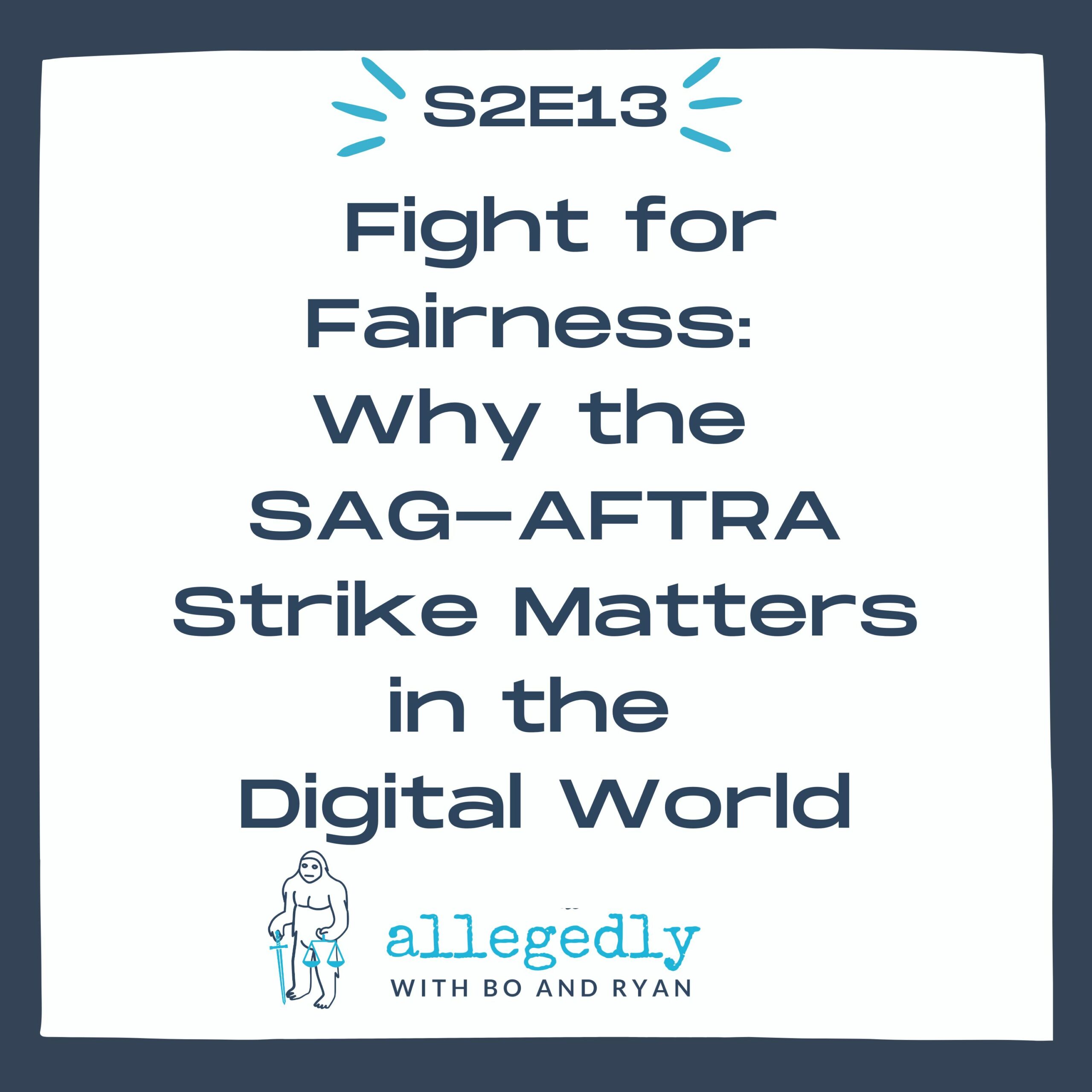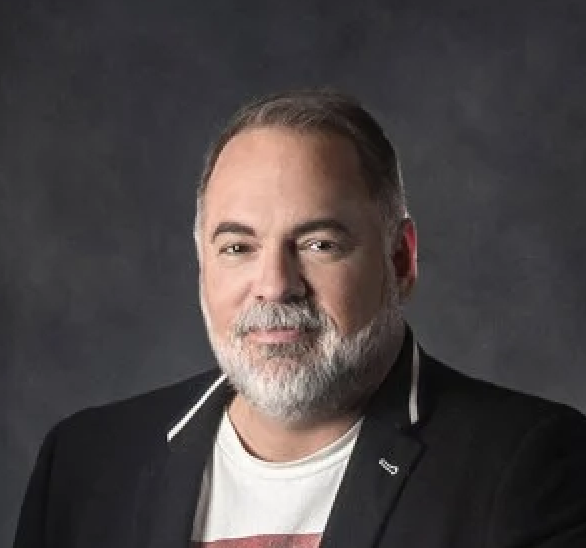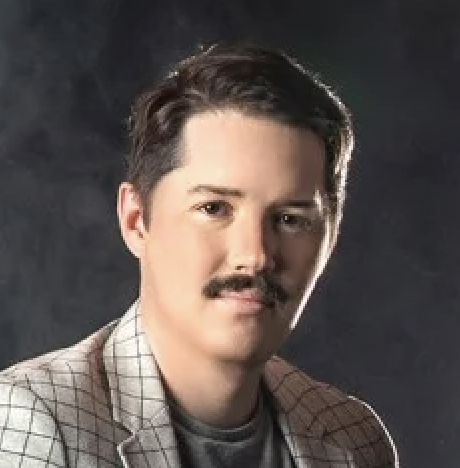allegedly with Bo and Ryan | Season 2 Episode 2
Today on the podcast, Bo and Ryan discuss their favorite frivolous lawsuits.
Allegedly… with Bo and Ryan Podcast S2E2| Transcript
Bo: [00:00:00] You are correct.
Ryan: [00:00:00] Yes!
Bo: [00:00:01] The killer whale lived up to its name. Well, then came the frivolous lawsuit part.
Ryan: [00:00:08] Welcome to allegedly with Bo and Ryan, the only entertainment and law podcast that brings you the truth, the whole truth, and nothing but the truth… allegedly.
Bo: [00:00:17] I’m Bo Bowen.
Ryan: [00:00:19] And I’m Ryan Schmidt.
Bo: [00:00:21] And you’re listening to Allegedly with Bo and Ryan. We’re coming to you from our law offices in beautiful, historic Savannah, Georgia, where we’ll be chatting about pop culture, hot legal topics in the news, and doing our best to change the way people think about the law and lawyers. But first, a little about us. Ryan is such a capable handyman that he puts MacGyver to shame. I once saw him start a fire using only dental floss and water.
Ryan: [00:00:50] And Bo has such an impeccable wardrobe that his shadow has been on GQ’s best dressed list twice.
Bo: [00:00:57] Together we are Savannah’s consummate renegade legal titans.
Ryan: [00:01:02] And the only corporate and entertainment lawyers in the free world who have never lost a single case… Allegedly.
Bo: [00:01:09] Well, welcome back to Allegedly with Bo and Ryan. I’m Bo. He’s Ryan. Allegedly. So let’s talk about what’s going on in Ryan Schmidt world this week. I understand you got a big trip coming up, Ryan.
Ryan: [00:01:24] I do. I do, yeah. My brother in law is a really talented rower. He was actually like an Olympic hopeful. He rowed for Syracuse in college, and he has been invited to row in the Heineken race in Amsterdam next month.
Bo: [00:01:40] Wow. So you’re going to go cheer him on?
Ryan: [00:01:42] Yeah, absolutely. And also, just walk around Amsterdam and see what else is going on there.
Bo: [00:01:49] Well, there’s quite a few things that go on in Amsterdam, Ryan. So we’ll all be waiting for a full report upon your return. Absolutely. So are you going to hit any other places while you’re there?
Ryan: [00:02:01] Yeah, we’re going to go to Amsterdam. Then we’re going to go down to Southern Germany, Munich and Ulm and all those good areas. And we’re going to Oberammergau, which we’re going to check out a mountain called the Zugspitze. So that’ll be…
Bo: [00:02:18] I’m pretty sure that’s on my bucket list
Ryan: [00:02:20] Exactly. And then we’re going to round out the trip with a few days in London.
Bo: [00:02:25] Wow. Well, that sounds like pretty amazing.
Ryan: [00:02:27] Yeah, Can’t wait.
Bo: [00:02:28] All right. Well, for our main topic today, Ryan, I thought maybe we could tackle something that it pops up in the news and in kind of junk emails every once in a while talking about frivolous lawsuits.
Ryan: [00:02:42] Okay, nice.
Bo: [00:02:43] I’m sure you’ve gotten those emails sometimes that talk about, Oh, look at this list of incredibly frivolous lawsuits that have been filed. I mean, we all see those on occasion, of course. Well, here’s the thing about those lists. Most of them never actually happened. I mean, they’re just complete garbage that’s sent out by, you know, insurance companies and other things to try to kind of bias people against plaintiffs and keep verdicts down. Some, on the other hand, may be on a list and they may sound frivolous, but they’re actually really not. I mean, when you actually learn the real facts of what happened, it’s kind of like, oh, okay, maybe that does make a little bit more sense. Yeah. But every once in a while there definitely are a few that do slip through the cracks that definitely qualify as frivolous.
Ryan: [00:03:37] Oh man. Yeah. So many come to mind.
Bo: [00:03:40] Well, give us like, what’s one to you? Is there anything jump to the forefront of your head when you think of frivolous lawsuits?
Ryan: [00:03:46] Okay. Got one. You know, and beer is on the mind because it was just the Super Bowl. And there’s so many always so many great beer commercials. But one of my favorite frivolous lawsuits was when a guy named Richard Overton sued Budweiser because it didn’t help him attract beautiful women.
Bo: [00:04:04] Man, please tell me he was successful.
Ryan: [00:04:08] Yeah, not so much. So Budweiser wasn’t the first company to use gorgeous, flirtatious women in their ad campaigns, nor were they the last. After all, sex sells, especially for the beer guzzling American man. What they may not have planned for, however, was just how convincing their advertising tactics would be. This sad, lonely guy named Richard Overton files a lawsuit against Anheuser-Busch in 1991 because despite consuming more and more of their beer in order to lure attractive, beautiful women from the advertisements, the lager fails to make his fantasies of having beautiful women fawn over him a reality.
Bo: [00:04:49] Oh, poor guy.
Ryan: [00:04:50] I know, right? So Overton ultimately sues Anheuser-Busch for $10,000, claiming to have suffered emotional distress, mental injury, financial loss and a whole bunch of other garbage claims. To the surprise of absolutely no one, however, the case was immediately dismissed.
Bo: [00:05:12] I mean, I have to say I’m a little disappointed because if you could get paid for not attracting beautiful women, pretty sure I’d be pretty wealthy by now. Sure. So but, you know, some of the I have to say, when I think frivolous lawsuits, a lot of some of the best ones have come from inmates over the years. I mean, think about it. What else are they going to do? They’re sitting around. You know, they’ve got the law library there. They flip through books and you get I mean, we see it here in our practice. We get these, you know, 15 page long, handwritten, single spaced letters that were like: oh no. But but they definitely have filed some wild, frivolous lawsuits over the years. Um, not all thoughts are good thoughts, though, when you’re sitting around a cell trying to think of something to do. And what immediately comes to mind is back in 1995, there was a guy named I think it was Richard Brock.
Ryan: [00:06:10] Okay.
Bo: [00:06:10] He took the unusual, but some may call genius, step of suing himself. So here’s how it worked. This guy’s serving time in a correctional center in Virginia, okay? He sues himself for $5 million for violating his own civil rights.
Ryan: [00:06:35] Trying to process this.
Bo: [00:06:36] Okay. So here’s here’s here was his reasoning. Okay. So. Brock alleges that his religion forbade the use of alcohol. Okay. Absolutely forbidden. Well, despite that fact, he made the intentional and or negligent choice to drink alcohol. And then he alleged it was that drinking of alcohol that led him to directly commit the crimes for which he was in jail, which was, I think it was breaking and entering. So you’re following me here? Okay.
Ryan: [00:07:13] Yeah.
Bo: [00:07:13] His religion forbids alcohol. He does it anyway, negligently, and then ends up committing a crime. While his lawsuit claim that he caused himself to violate his religious belief and he angrily demanded $5 million from himself for this behavior. And then, in a stroke of pure genius, he insisted that the state should pay the $5 million on his behalf because he was, “a ward of the state and they were responsible for his behavior.” So, you know, shockingly, again, case dismissed.
Ryan: [00:07:54] Yeah, that’s not so surprising. I mean, how many how many times have we seen like pro se cases in our practice where those those pleadings just go on and on and they make absolutely no sense.
Bo: [00:08:05] I mean, they come out every year. I mean, they’re wild but highly entertaining on occasion, but not a lot of fun to defend against.
Ryan: [00:08:17] Oh absolutely. So I got one. Not all frivolous lawsuits actually come from prison inmates or even lunatics. I can tell you about one filed by an actual judge.
Bo: [00:08:29] All right. Well, this sounds good.
Ryan: [00:08:31] So we’ve all had our issues with customer service, right? Comcast immediately comes to mind for me. But in one case, in Washington, DC, the phrase “satisfaction guaranteed” resulted in a multi-million dollar legal battle.
Bo: [00:08:45] All right.
Ryan: [00:08:47] So in 2005, Roy Pearson was preparing to begin his first day of his brand new job as an administrative law judge, and he was looking forward to sporting a nicely pressed suit for the occasion. Right. And he takes a pair of his slacks to a local dry cleaner for alterations. And when he goes to pay the $10 bill and pick them up, the dry cleaner couldn’t find the pants.
Bo: [00:09:13] Well, okay, we’ve got a tragedy brewing. I see.
Ryan: [00:09:17] Within the very next day, the dry cleaner realizes that the pants accidentally got sent to the wrong place. They get it back and they offer to give it back to the judge. But he insists that they aren’t his actual pants, which they totally were. Okay. So then at that point. Instead of just accepting the pants and the inconvenience of being without them for a day, the judge threatens to sue because the dry cleaners had a sign in their window that said “satisfaction guaranteed.”
Bo: [00:09:53] All right.
Ryan: [00:09:54] So the owners of the dry cleaners ultimately offer him a ridiculous $12,000 settlement, which was above and beyond what they should have done. He refuses this. Instead, he files a suit for inconvenience and mental anguish and asks for $67 million.
Speaker3: [00:10:18] Wow. That must have been some damn good pants.
Ryan: [00:10:21] I’m telling you, it’s like gold thread in there or something like that. Well, during the trial, Judge Pearson actually breaks down in tears while detailing the horrible tragedy of losing his pants for one day. Well, guess what? He loses the case. And not only does he lose, he actually gets removed from the bench.
Bo: [00:10:43] So happy ending.
Ryan: [00:10:45] Yeah, exactly. So more most importantly, from that day forward, he will forever be known as Judge Fancy Pants.
Bo: [00:10:53] Wow. But of course.
Ryan: [00:10:56] So was that worth it? Probably not.
Bo: [00:10:59] Well, speaking of, like, famous, you know, people like, you know, you think a judge should have known better than that? One of my favorite frivolous lawsuits of all time involved none other than Michael Jordan.
Ryan: [00:11:13] Okay.
Bo: [00:11:14] So now come on. Everybody loves Michael Jordan, at least everybody that didn’t have to actually play against him.
Ryan: [00:11:22] Fair enough.
Bo: [00:11:22] You know, but you know, one of the most popular athletes of all time, there was this huge ad campaign where it was all about how everybody wanted to “be like Mike” do you remember that?
Ryan: [00:11:34] Of course.
Bo: [00:11:34] Well, it turns out there’s definitely at least one guy who did not want to “be like Mike.” In fact, he filed an $832 million lawsuit against Michael Jordan and Nike because he said that Michael Jordan just simply looked way too much like him.
Ryan: [00:12:02] Oh, my God.
Bo: [00:12:04] I mean, it’s so ridiculous. I mean, I don’t see you suing Brad Pitt, Ryan. I mean, come on.
Ryan: [00:12:09] Fair enough. The resemblance is uncanny.
Bo: [00:12:12] All right. So this is what happens. 2006. This guy’s name is Allen Packard. Okay. Or Heckard, I think. He lives in Portland. He files this wild lawsuit. Now, half the amount, about 400 million, it’s aimed at Michael Jordan for having similar facial features to poor old Allen, while the other 400 million is aimed at Nike because he says they turned Michael Jordan into one of the most recognizable figures in the world. You know, made this horrible sin. Well, it turns out, much like you and Brad Pitt, Ryan, Allen Heckard had actually been constantly mistaken for this NBA superstar for for years. I mean, he really did have an uncanny resemblance to the guy.
Ryan: [00:13:05] Well, that sounds terrible. Everybody wanted my autograph, wanted to, like, give me like, free tickets to things, free meals.
Bo: [00:13:13] Well, it turns out this guy had gotten really sick of the fact that people were all, “oh, my God, are you Michael Jordan?” You know, And so he told the court that because Michael Jordan decided to have the same face as him, it had caused him $800 million worth of emotional pain and suffering. Surprisingly, this case did not get dismissed like the others were talking about, but only because he decided to drop it himself, before it got thrown out.
Ryan: [00:13:45] That’s that’s that’s one way of not getting that on the record.
Bo: [00:13:50] So, yeah, you got to feel bad for the guy, right?
Ryan: [00:13:54] No. Absolutely not. I don’t understand why he wouldn’t want to look like a celebrity. Especially at like the height of Michael Jordan’s fame.
Bo: [00:14:06] Yeah, I mean, we’re not talking about You look just like Steve Buscemi, right?
Ryan: [00:14:13] Oh, my God. I’m always at these bars, and all these women are coming up to me like, are you Michael Jordan?
Bo: [00:14:18] Yes, I am.
Ryan: [00:14:20] And he’d say, no, and I’m sick of you asking me. Well, I’ve got one. So you know the show, “Dexter.” Sure, Yeah, we love that show. Well, given our focus on entertainment law, it makes me think of a 2014 case in which a New Yorker sues Showtime because an advertisement for the TV show Dexter was just too scary.
Bo: [00:14:43] Oh, boy.
Ryan: [00:14:45] So she claims that she’s walking up the stairway in Grand Central Station when she’s rounding the corner and she spots a poster advertisement with Dexter on the cover. And the ad features a photo of Michael C Hall, who plays the serial killer on the show, with his face covered in cellophane.
Bo: [00:15:03] I actually remember that ad.
Ryan: [00:15:05] Of course. I mean, who doesn’t? But it’s just part of his character and it’s great. Well, the woman was so startled, she alleges that the image was so scary and disturbing, that it caused her to fall down the stairs and suffer injuries to her right foot and ankle.
Bo: [00:15:22] So what happens in this case?
Ryan: [00:15:26] A judge ultimately decides that this reaction was not foreseeable. Thus, Showtime was off the hook in the case was thrown out.
Bo: [00:15:34] Wow. I mean, people do some wild things. That reminds me of another case, talking about entertainment. A guy named David Roller, he sued David Copperfield, the magician. Okay. So he sued him for copyright infringement. Oh, God. Now, you know, we deal with copyright infringement all the time. It’s part of our practice. I mean, and it’s obviously a real thing. There’s nothing fake if someone steals someone else’s copyright or infringes upon it. You know, it’s definitely actionable. But David Roller might have had a little bit of a difficult time understanding the concept, because what he claimed in his lawsuit was that he had filed a patent on his own godly magic powers and that David Copperfield was using them without his express written permission.
Ryan: [00:16:35] How dare he?
Bo: [00:16:37] Well, it turns out, and you really don’t have to be a wizard to guess this, David Roller did not actually have a patent on his magic godly powers. And it was, you guessed it, Dismissed. But then again, how could he have held that patent when the Bowen Law Group obviously owns the world’s only patent on magic godly powers? … Allegedly.
Ryan: [00:17:05] I would have loved to have been the lawyers for David Copperfield in this case and just cross-examine that guy. All right. Let’s see. These powers he got here.
Bo: [00:17:16] It would have been pretty fun.
Ryan: [00:17:18] Show me a trick, wizard. Well, these are really fun. Let’s do a couple more. I remember reading about a case in 2005 where a woman claimed that she found a finger, a human finger, in a bowl of chili she bought from a Wendy’s in California.
Bo: [00:17:38] Oh, I remember that. That was all over the news for a while back then.
Ryan: [00:17:42] I couldn’t go to Wendy’s for like years after that. Well, needless to say, it resulted in a bit of bad publicity for Wendy’s, which ended up losing tens of millions of dollars in sales. Nobody wanted to buy their chili or anything else, really.
Bo: [00:17:58] Yeah, it is pretty gross.
Ryan: [00:18:00] Now, that definitely would not have been a frivolous lawsuit if it actually happened, right? Right. But you might see where this is going. After a lengthy investigation found no evidence of any missing fingers at the Wendy’s where it was allegedly found or anywhere along Wendy’s supply chain, that’s when suspicion turned on the woman who filed the lawsuit. She was eventually arrested and found guilty of attempting to extort money from Wendy’s, which, of course, leads to the obvious question where the hell did that finger actually come from? It turns out that one of her husband’s coworkers had his finger cut off in work and in a work accident and had sold it to the couple for 100 bucks.
Bo: [00:18:53] Wow.
Ryan: [00:18:55] I mean, imagine coming home, “Honey, the craziest thing happened at work. You know, Bob lost his finger in the hacksaw, and she’s like, I’ve got an idea.”
Bo: [00:19:08] What could go wrong? Oh, man. Well, you know. Well, let’s do one more. All right. So remember, this is probably before your time, Ryan, but this. This happened way back in 1999. Okay. There’s a guy named Daniel Dukes. And Daniel Dukes, Ryan, had a dream, okay? He had a dream to swim with a killer whale. So Mr. Dukes decides to do what any sane, rational human would do with that type of dream. He breaks into SeaWorld and dives into the killer whale tank.
Bo: [00:19:50] Well, can you guess what happened next, Ryan?
Ryan: [00:19:54] Is he sleeping with the fishes?
Bo: [00:19:55] Oh, I see what you did there. But you are correct. Yes. The killer whale lived up to its name. Well, then came the frivolous lawsuit part. All right. The distraught parents of Mr. Dukes sued SeaWorld. Now, you may think, well, okay, maybe they sued on the grounds of an attractive nuisance or lack of security or something like that. Nope. What they claimed was that SeaWorld had intentionally made killer whales seem way too friendly and lovable because they were selling cute, adorable plush toy versions of them in their gift shop. And this cuddly version of of killer whales led directly to their son’s death. I can’t help but wonder how they apparently missed the fact that they are actually called “killer whales.” I mean, it’s right there in the name. And once again, the case got thrown out.
Ryan: [00:21:07] Oh, man. Well, I did love SeaWorld growing up, but after watching that movie Blackfish, I just I just can’t look at them anymore.
Bo: [00:21:17] Is that one of those, like, documentaries, like like the ones about fast food that make you never want to walk into a fast food restaurant?
Ryan: [00:21:24] Exactly. It’s just like it’s just 20 years of, like, SeaWorld covering up the fact that, like, trainers just mysteriously die while training with them.
Bo: [00:21:33] Oh, man. Well, it’s like, you know, I haven’t seen that, but I do hear the stories about, you know, oh, they’re cruel to the animals. And I mean, it’s like you do start feeling guilty for ever having gone to SeaWorld.
Ryan: [00:21:50] Oh, for sure. Well, there are definitely some frivolous cases out there, but you can’t always judge a case just on the headlines. One example of this is the man in the phone booth.
Bo: [00:22:02] Oh, that’s an old one. I remember that.
Ryan: [00:22:04] So back in the 1980s, then-President Ronald Reagan made Charles Bigby a national joke.
Speaker3: [00:22:11] He did.
Ryan: [00:22:13] In a speech, Reagan told the story of, “the guy who sued the phone company because a drunk driver hit the phone booth,” and even referred to Bigby as a loony. On the surface, the lawsuit sounds pretty absurd, but in reality, there’s a lot more to the story. So Charles Bigby saw this car coming and he’s in this phone booth, but he’s unable to escape the collision because the door of the phone booth just wouldn’t open. So the phone company had already received several complaints about people being stuck in that same phone booth because the door was being jammed. The phone booth was placed on a corner that was known to be dangerous and was actually replacement for another phone booth that had been destroyed due to a previous car crash.
Bo: [00:22:59] That’s being put on notice.
Ryan: [00:23:01] Right. Then witnesses describe seeing Bigsby struggling to open the door and escape the phone booth as the drunk driver barreled toward it because it just wouldn’t open. And Bigby gets super hurt. He actually lost a leg in the crash and was not only unable to return to work, but he suffered from severe depression for the rest of his life. I’m sure that Reagan joke only added insult to injury.
Bo: [00:23:26] Yeah, no doubt.
Ryan: [00:23:27] So ultimately, the phone company took responsibility for the design, maintenance and placement of the phone booth and paid him on a settlement. But most people don’t know that side of the story.
Bo: [00:23:37] No, that’s for sure. I mean, which which, you know, leads directly to the, you know, one story that immediately pops to everyone’s head when they think frivolous lawsuit. And that’s the hot coffee at McDonald’s case, of course. I mean, that’s sort of the the ultimate frivolous lawsuit that people have been talking about or using as an example of frivolous lawsuits for decades now. Now, people don’t understand exactly what happened in that case. Almost no one does unless you watch the documentary, “Hot Coffee” or done some research on it. Here’s what you probably think you know. Okay. You probably think some old woman spilled her coffee while she was driving, was surprised to find out it was hot and then sued McDonald’s for millions of dollars. And this crazy runaway jury just gave it to her. I mean, what a what a travesty. That’s just insane. Well, if that sounds nuts, that’s because it is nuts. That is not what happened at all. And so here’s what what actually happened. And I feel so bad for this woman. Her name was Stella Liebeck. And the backlash against this case was so strong that they actually had these awards called the Stella Awards, named after her for the most frivolous lawsuit of the year every year. It was just I mean…
Ryan: [00:25:03] Oh, my God.
Bo: [00:25:04] Insult to injury. But but here’s what happens to this lady, Stella Liebeck. First of all, she’s not driving, okay? She’s a passenger in a vehicle. And the coffee did spill on her. But this is not your typical spilled hot coffee, you know, variety of burns. This woman ended up suffering third degree burns on her groin, her thighs, her buttocks and her genitals. Okay. I mean, she was hospitalized for weeks after this incident. Now, Stella herself only asked McDonald’s to cover the portion of her medical bills that Medicare didn’t take care of, which was about $20,000. That’s it. But McDonald’s absolutely refused to pay even a penny. Well, what the jury found out over the course of that trial, was that McDonald’s actually knew that their coffee was dangerously hot. They had received many, many complaints. They had settled many serious injury claims prior to Stella Liebeck’s horrific burns. And in fact, they had been ordered to reduce the temperature of their coffee to avoid future injuries. But the jury learned that [the McDonalds’ executives] met and decided that it would be cheaper for them to just pay future injury claims than to spend the money to replace the coffee machines in all their restaurants. So I mean, it was pretty callous. You know, so what the jury decided is that they wanted to at least get McDonald’s attention and say, look, you can’t put people’s lives and their safety above profits. So what they did, they awarded $2.7 million in damages for a very specific reason, because that was the amount equal to the money that McDonald’s collected in coffee sales in two days across the country. So two days worth of revenue from coffee sales, $2.7 million. That’s why the jury came up with that number. They wanted to get their attention and they actually did. Mcdonald’s changed their coffee makers, and no one to this day has ever suffered a horrific injury like that ever again.
Ryan: [00:27:39] Good.
Bo: [00:27:40] So it goes to show you, Ryan, just because someone claims something is frivolous, that doesn’t necessarily make it true.
Ryan: [00:27:48] You mean kind of like how some lawyers make the actually frivolous claim that they can beat The Bowen Law Group?
Bo: [00:27:54] Exactly, Ryan. It will never happen because we are the most successful lawyers in the history of human jurisprudence… Allegedly.
Ryan: [00:28:05] Well, that’s our show for today. Thanks for listening to the legal mastery of the highly intelligent and easily most attractive, true legal outlawyers in Savannah. And remember the only lawyers in the free world who have never lost a single case …
Bo: [00:28:17] allegedly.
Ryan: [00:28:17] To continue to receive free edge of your seat legal anecdotes, mind blowing takes on hot topics, and a general masterclass in awesomeness, please head over to bowenschmidt.com/podcast and …
Bo: [00:28:27] Dude, the idea that people don’t know what to do by now is frivolous. Just hit the subscribe button already.














